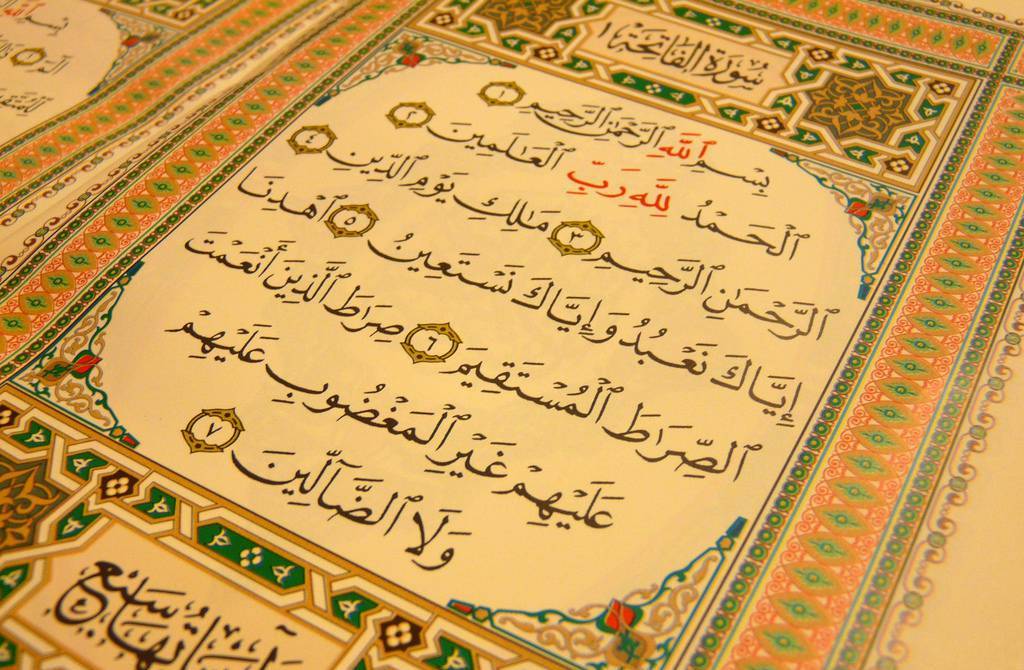بِسْمِ اللهِ الرَّحْمٰنِ الرَّحِيْمِ
إِيَّاكَ نَعْبُدُ وَإِيَّاكَ نَسْتَعِينُ
It is You we worship and You we ask for help.
Iyyaka na’budu wa-iyyaka nasta’een
Before getting to this ayah Allah gave us an introduction to Himself, each of which is individually enough to make us submit to Him. The first trait was the fact He deserves praise and thanks and His position as our master – if those weren’t enough then comes a’rahman and a’raheem – if that wasn’t enough He puts us in our place by reminding us of the day of judgement in which we will all stand.
After these reasons, we are more than ready to submit thus the introduction to the next ayah “it is you we worship”. What’s interesting here is that Allah did not say “you will worship me” which implies compulsion. Instead He puts those words in first person as in: this is what you should be saying: “iyyaka na’budu” which briefly translates to “it is only and entirely to you that we give ourselves into slavery and worship”.
The first 3 ayahs are talking about Allah, yet in this ayah we are talking to Allah and not about Him which is as a result of His trait as a master that listens to the slave. It is a very powerful notion and is mentioned in Al-Fatiha as a scope to the rest of the Qur’an for us to always keep in mind that He is always paying attention to each and every one us.
“Iyyaka na’budu” is a declaration of slavery to Allah. It is a statement telling Allah that we give up our independence and it is the only time we are truly free in this dunya.
Think about it this way: every single person in the world is enslaved to something whether they know it or not. Either they’re enslaved to their body or temptation or desires or peer pressure or culture or money or whatever it may be – we are all shackled one way or another.
Now when we enslave ourselves to the creator none of these things will keep us chained. You don’t have to look a certain way for society to accept you; you don’t have act a certain way or pretend to fit in because the one that you need to impress is Allah – it’s a form of independence from the shackles of the world.
Allah specifically uses the word “abada” here derived from the word “ibada” which does not merely mean worship but also enslavement. This is because it can be the case that a Muslim carries out worship but does not have the attitude of a slave.
What exactly is the definition of a slave? Essentially it comes down to: someone who carries out the instructions of their master and does not do what they want unless the master allows for it.
The main connection between master and slave is guidance and there cannot be guidance without instructions, thus the second half of the ayah “iyyaka nasta’een”. “Nasta’een” derived from “isti’ana” is the kind of help we ask for when we are struggling and to struggle with something means that we are already trying to fulfil it. Doing nothing and asking for help with something simply does not fit into this category.
This is essentially telling Allah that we are already struggling with something but we simply cannot do it ourselves, thus we need His help. It also tells us that if we’re not making any effort then we have no right to ask Allah for assistance. An example could be the person that wishes to stay away from zina yet they’re not fulfilling their daily prayers. How do we hope for Allah’s help when we are not trying?
“Isti’ana” is a formula for life. Throughout the Qur’an we read stories about previous nations and prophets and the main theme is these stories is that struggle is first then Allah’s help comes after. Musa suffers against the Pharoah then Allah gives Him victory over the whole nation; the wife of Pharoah struggles through being the spouse of a monster and then she’s guaranteed jannah; Yusuf is caged in prison then Allah gives Him leadership; Maryam suffers as a single mother alone in the desert then she’s given rest through the prophet Isa and an honourable status with Allah, and many more.
One thing we must be weary about is that we recite this ayah throughout the day in front of Allah. If we tell Allah that we submit to Him and that we are in need of help because we are already trying, yet we are constantly sinning and not struggling to get better at all then we are not just lying to ourselves.
Allah knows best.
